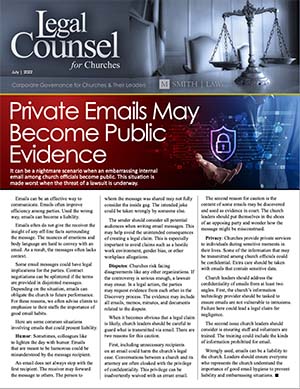It can be a nightmare scenario when an embarrassing internal email among church officials become public. This situation is made worst when the threat of a lawsuit is underway.
Emails can be an effective way to communicate. Emails often improve efficiency among parties. Used the wrong way, emails can become a liability.
Emails often do not give the receiver the insight of any off-line facts surrounding the message. The nuances of emotions and body language are hard to convey with an email. As a result, the messages often lacks context.
Some email messages could have legal implications for the parties. Contract negotiations can be splintered if the terms are provided in disjointed messages. Depending on the situation, emails can obligate the church to future performance. For these reasons, we often advise clients to emphasize to their staffs the importance of good email habits.
Here are some common situations involving emails that could present liability.
Humor: Sometimes, colleagues like to lighten the day with humor. Emails that are meant to be humorous could be misunderstood by the message recipient. An email does not always stop with the first recipient. The receiver may forward the message to others. The person to whom the message was shared may not fully consider the inside gag. The intended joke could be taken wrongly by someone else.
The sender should consider all potential audiences when writing email messages. This may help avoid the unintended consequences of creating a legal claim. This is especially important to avoid claims such as a hostile work environment, gender bias, or other workplace allegations.
Disputes: Churches risk facing disagreements like any other organizations. If the controversy is serious enough, a lawsuit may ensue. In a legal action, the parties may request evidence from each other in the Discovery process. The evidence may include all emails, memos, minutes, and documents related to the dispute.
When it becomes obvious that a legal claim is likely, church leaders should be careful to guard what is transmitted via email. There are two reasons for this caution.
First, including unnecessary recipients on an email could harm the church’s legal case. Conversations between a church and its attorney are often cloaked with the privilege of confidentiality. This privilege can be inadvertently waived with an errant email.
The second reason for caution is the content of some emails may be discovered and used as evidence in court. The church leaders should put themselves in the shoes of an opposing party and wonder how the message might be misconstrued.
Privacy: Churches provide private services to individuals during sensitive moments in their lives. Some of the information that may be transmitted among church officials could be confidential. Extra care should be taken with emails that contain sensitive data.
Church leaders should address the confidentiality of emails from at least two angles. First, the church’s information technology provider should be tasked to ensure emails are not vulnerable to intrusions. Failure here could lead a legal claim for negligence.
The second issue church leaders should consider is ensuring staff and volunteers are trained. The training could include the kinds of information prohibited for email.
Wrongly used, emails can be a liability to the church. Leaders should ensure everyone who represents the church understand the importance of good email hygiene to prevent liability and embarrassing situations.

